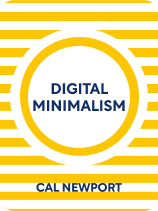

This article is an excerpt from the Shortform book guide to "Digital Minimalism" by Cal Newport. Shortform has the world's best summaries and analyses of books you should be reading.
Like this article? Sign up for a free trial here .
Are you looking for Digital Minimalism quotes by Cal Newport? What are some of the most noteworthy passages that highlight the author’s key ideas about the digital minimalist lifestyle?
In his book Digital Minimalism, Cal Newport applies the lifestyle concept of minimalism to the use of technology. The following quotes and passages from the book highlight some of the key ideas discussed.
Keep reading for four Digital Minimalism quotes by Cal Newport.
Digital Minimalism: Quotes by Cal Newport
In Digital Minimalism, Cal Newport explains how you can transform your tech habits by adopting digital minimalism, which aims to maximize the benefits of technology and avoid the pitfalls by identifying your values and determining how to use technology to support them. Below are some quotes and passages that discuss some of the key insights and recommendations covered in the book.
“How tech companies encourage behavioural addiction: intermittent positive reinforcement and the drive for social approval.”
There are two psychological mechanisms behind social media addiction: intermittent positive reinforcement and the drive for social approval.
- Intermittent positive reinforcement means that, when you get unpredictable rewards for your behavior, you’re more driven to continue that behavior than if the rewards were consistent. On social media, the “Like” button is one form of intermittent reward: When you post a photo on Facebook, you may get a swarm of likes and comments, or you may get none.
- The drive for social approval means that humans have an evolutionary impulse to seek and reciprocate social approval. On social media, likes and comments convey social approval. Your ancient social urges push you to compulsively check your notifications to find out whether your peers have validated you with the thumbs-up button—and, when you don’t get that feedback, the feeling of distress and rejection urges you to keep checking your notifications.
“Digital minimalism definitively does not reject the innovations of the internet age, but instead rejects the way so many people currently engage with these tools.”
According to Cal Newport, it’s not technology that is the problem, but the way people tend to engage with it. Specifically, relying on technology to fulfil your social needs because it’s easier and faster. However, digital communication doesn’t actually satisfy our social needs in the same way as face-to-face interaction does. It only provides an illusion of being connected while robbing us of the time we could use for more meaningful offline social interactions.
“By removing your ability to access social media at any moment, you reduce its ability to become a crutch deployed to distract you from bigger voids in your life. At the same time, you’re not necessarily abandoning these services. By allowing yourself access (albeit less convenient) through a web browser, you preserve your ability to use specific features that you identify as important to your life—but on your own terms.”
Social media apps are designed to be more addictive than the web versions, so the best way to curb the compulsive need to check your social media is to simply delete the apps from your smartphone. Since you’ll have to log onto a computer to access those platforms, it will naturally limit how often you use them, and you’ll be more selective about when and why you log on. Many people who have tried this strategy changed the way they used social media: Instead of signing on frequently and scrolling aimlessly, they began using it briefly just a couple of times a week for specific uses. Other people stopped using social media, because the barrier of logging onto a computer for access outweighed the benefits.
“Conversation enriches the understanding, but solitude is the school of genius.”
According to Newport, solitude is essential for creativity and problem-solving. Great thinkers throughout history have recognized the benefits of solitude. For example, Abraham Lincoln spent much of his presidency commuting from the White House to a quiet cottage on the edge of the woods so that he could have the solitude he needed to work through challenges. Lincoln used his commute time as well as the quiet space the cottage provided to sit in thought and walk the grounds as he contemplated how to lead the country through the Civil War. Lincoln even wrote the first drafts of the Emancipation Proclamation at the cottage. René Descartes, Immanuel Kant, and Friedrich Nietzsche were among others who had no families and few friends, but used solitude to lead productive, notable lives.

———End of Preview———
Like what you just read? Read the rest of the world's best book summary and analysis of Cal Newport's "Digital Minimalism" at Shortform .
Here's what you'll find in our full Digital Minimalism summary :
- Why you're addicted to technology (and how tech companies feed your addictions)
- How a focus on social media is bad for real-life relationships
- How to transform your tech habits to get the best benefits without the drawbacks






